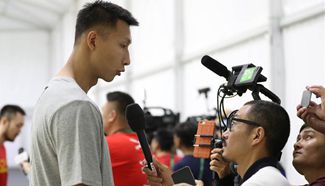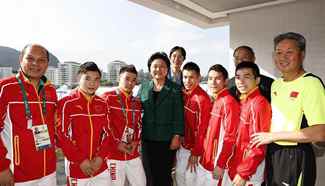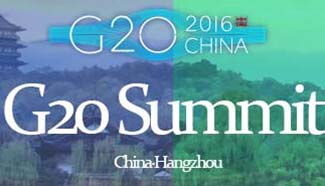TIANJIN, Aug. 5 (Xinhua) -- Four people were convicted of subverting state power and sentenced by a court in Tianjin after serial trials in the past four days.
Of the four, Hu Shigen, an illegal church leader, got the longest prison term of 7.5 years. He is the eldest at 61 and had engaged in state power subversion since the 1990s.
Zhou Shifeng, a lawyer who formerly managed the Fengrui Law Firm in Beijing, was sentenced to seven years in prison.
Zhai Yanmin, an unemployed resident of Beijing, was sentenced to three years in prison, suspended for four years.
Entrepreneur Gou Hongguo received a suspended three year sentence.
Zhai and Gou may not be jailed if they do not re-offend during the probation period.
All of them accepted the charges and expressed remorse. None chose to appeal.
The four met to "establish a systematic ideology, method and steps" to subvert state power, according to the court statements.
Hu masterminded, spreading subversive ideas and plans and training agents such as Gou; Zhou ran the law firm as a front to carry out subversive activities with Hu and others; and Zhai, the "enforcer," who was instructed by Hu to organize paid petitioners for illegal protests, according to the statements.
Chen Yaodong, vice head of the Law School of Nankai University who observed proceedings, came to the conclusion that the trials were "open and fair," and that China's judiciary handled these sensitive cases with order.
"There's no place for outlaws in our country under the rule of law, and any activities to subvert state power via violence, 'peaceful evolution' or 'street politics' will be punished by law," he added.
"SPIRITUAL LEADER" HU
Hu is a native of Nanchang city in east China's Jiangxi Province. He was a teacher in a Beijing university before engaging in subversive activities.
He was sentenced to 20 years in prison in 1994 for "counter-revolutionary" crimes. He returned to his subversive ways not long after he was released in 2008.
Hu has been spreading the idea of "pushing down the wall", namely overturning China's existing system and realizing a "color revolution."
"Hu Shigen is our 'spiritual leader,'" Zhai Yanmin said in his testimony, adding Hu greatly influenced his ideas and concepts.
According to testimony of witnesses, Hu has been engaged in "brainwashing" through alleged "missionary" activities. Hu was proud to make a fuss over sensitive legal cases, often, through conflicts raised by paid petitioners.
Hu even misled the petitioners that "it is an honor to be detained," promising them financial compensations if they were.
A witness surnamed Liu said, Hu regarded petitioners as a force to subvert state power, as they "are bold enough and readily stirred up," and "obey his orders."
Gou Hongguo said, petitioners have one thing in common which is a grudge against governments, therefore, if organized, they can be a powerful force against the government.
The Qing'an incident is one example of Hu's "pushing down the wall." In May 2015, police officer Li Lebin shot dead Xu Chunhe at Qing'an County Railway Station in Heilongjiang Province, after Xu attacked Li despite multiple warnings. CCTV cameras and follow-up investigations confirmed that Li had acted within the law.
But Hu instructed Zhai to organize protests at the railway station and in front of the county government buildings, influencing online opinion and misrepresenting the incident as police brutality.
"I just wanted to smear the judicial organs, police and government," confessed Hu.
Hu also put forward the idea of "three factors" -- stronger citizen power, an internal split within the ruling bloc, and interference of international society -- and "five plans" for "peaceful transformation."
"I instilled these ideas to others with the very aim of achieving a 'color revolution,'" Hu said.
UNSCRUPULOUS LAWYER
Zhou, 51, is originally from Anyang City, Henan Province. He was director of the Fengrui Law Firm, which was suspended from operations in 2015 after a police investigation into several of its employees.
Zhou confessed he was unsatisfied with current judicial systems and the government. He has long been influenced by anti-China forces and gradually established ideas to overturn the country's political system.
Since 2011, Zhou has used the law firm as a front for his subversive agenda, recruited like-minded lawyers and other staff and together they discredited judicial organs, attacked the judicial systems and promoted anti-government sentiment by interfering in and inflating the importance of sensitive cases.
According to a prosecution witness who used to work at Zhou's firm, Zhou recruited two key administrative assistants, surnamed Wu and Liu, neither of whom were lawyers. Liu's duty was to analyze sensitive cases and to identify loopholes, while Wu was responsible for promoting them.
Zhou hired them to distort facts, cause confusion and social instability, and attack the country's judicial system.
In March 2015, while a local court in Hebei Province was hearing an extortion case taken on by Zhou's firm, he instructed lawyers to take pictures of prosecutors and judges and post them online, fabricating rumors about their moral characters.
Lyu Hongbing, vice head of the All China Lawyers Association who was present at the court this week, noted that these cases serve as a lesson for all lawyers.
"Revere the law, stick to the facts and protect you clients' legitimate interests," Lyu urged.
FOREIGN SUPPORT
The activities of this group had received foreign supports over the years, investigations found.
In March and April 2014, Gou was sent by Hu to attend a program abroad that trained the participants with theories and techniques of how to subvert a government.
"Some separatists seeking 'Tibet independence' and 'Xinjiang independence' also took part in this 'leader camp' to learn anti-China theories and skills to confront the government and law enforcement agencies," Hu Shigen confessed.
"I found the program was actually a gathering of members from all anti-China groups," Gou said. "Hu himself could not leave the country so he planned to make me his agent in activities of 'civil movements' abroad and a right-hand man in domestic operations. Once the movement picks up at home, I can organize people through what I learnt in the program."
Wang Yu, a lawyer working for Zhou, also went to training programs in Britain, Switzerland, Thailand, Taiwan and Hong Kong, together with her husband Bao Longjun, sponsored by foreign organizations.
"They contacted me and offered me free chances to learn about the judicial system and humanitarian programs in the West. During these visits, I was instilled with Western ideologies and also learnt how to use encryption softwares and softwares for bypassing Internet firewall," said Wang, who was investigated in a separate case.
Foreign organizations also offered financial assistance. According to Li Heping, another lawyer close to Zhou, he had received funds from a foreign foundation since 2013 for a three-year project.
According to Li's assistant, surnamed Gao, the project trained a selected group of lawyers and paid petitioners to organize protests and manipulate public opinion.
Training programs or operations were approved by the foundation and thus all the cost were covered, Gao said.
The protest organized by Wu in front of a provincial-level court of Jiangxi last year was sponsored by the foundation, he said.
In September 2015, some foreign organizations even helped smuggling Wang's son out of China to Myanmar. Before he left for Thailand on his way to a Western country, the minor was intercepted by Myanmar police and returned to China.
Zhou admitted that foreign organizations showed keen interest in his activities.
"Their purpose of approaching me is to use us to challenge China's court order and judicial system and cause trouble for the Chinese government. Their ultimate goal is to overthrow the rule of the Communist Party of China," Zhou said.
Wang Zeqing, a legislator with the Tianjin Municipal People's Congress, noted that a "color revolution" is in essence a malign political attempt by some Western countries or interest groups to instigate domestic conflicts and collude with the country's insurgent forces to intervene in its domestic affairs, cause chaos, subvert state power and sway international political landscape and then reap benefits.
"It runs counter to real democracy and progress and will cause huge damage to society," Wang said, adding that such attempts -- mere noise compared with the mainstream rhythm of national social and economic development -- are doomed to fail.










